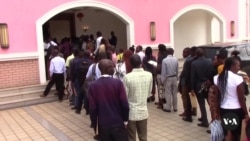ລັດຖະບານຂອງມາລາວີ ກຳລັງສົ່ງຊາວໜຸ່ມ ໄປເຮັດວຽກ ຢູ່ໃນຟາມ ຂອງອິສຣາແອລ ທ່າມກາງຄວາມຂັດແຍ່ງກັບກຸ່ມຮາມາສ. ບັນດານັກວິຈານກ່າວວ່າ ໂຄງການດັ່ງກ່າວຖືກປິດເປັນຄວາມລັບ ແລະໄດ້ເປີດເຜີຍບັນຫາການຫວ່າງງານໃນປະເທດ. ນັກເຄື່ອນໄຫວເພື່ອສິດທິມະນຸດໄດ້ໂຕ້ແຍ້ງວ່າ ຊາວໜຸ່ມເຕັມໃຈທີ່ຈະຮັບເອົາໂອກາດຢູ່ໃນຕ່າງປະເທດ ເຖິງແມ່ນວ່າຈະມີຄວາມສ່ຽງກໍຕາມ. ຈິມເວມວີ ປາດາທາ (Chimwemwe Padatha)
ມີລາຍງານຈາກນະຄອນຫຼວງ ລີລອງເວ (Lilongwe), ເຊິ່ງອາດນະສັກ ມີລາຍລະອຽດ.
ບັນດາຊາວໜຸ່ມເປັນຈຳນວນຫຼວງຫຼາຍ ລຽນແຖວຢູ່ທີ່ບັນດາສູນລົງທະບຽນ ເພື່ອຮັບສະໝັກງານ ຄືແບບນີ້ ພາຍໃຕ້ໂຄງການທີ່ໃຫ້ໂອກາດແກ່ຊາວມາລາວີ ໄດ້ໄປເຮັດວຽກໃນຟາມ ໃນ ອິສຣາແອລ. ພວກເຂົາເຈົ້າຫວັງວ່າຈະເຂົ້າຮ່ວມກັບຊາວມາລາວີ ອີກປະມານ 600 ຄົນທີ່ໄດ້ເດີນທາງໂດຍເຮືອບິນ ໄປອິສຣາແອລ ໂດຍຜ່ານໂຄງການກະສິກໍາ.
ຊາວເມືອງ ບລານໄທເອີ (Blantyre), ເມືອງໃຫຍ່ອັນດັບສອງຂອງປະເທດ, ນາງ ຣູດ ຄານຈຸນຈູລູ (Ruth Kanchunjulu) ອາຍຸ 23 ປີ ກຽມພ້ອມສໍາລັບໂອກາດດັ່ງກ່າວ.
ນາງ ຣູດ ຄານຈຸນຈູລູ (Ruth Kanchunjulu), ຊາວເມືອງ ບລານໄທເອີ (Blantyre), ກ່າວເປັນພາສາອັງກິດ:
“ມັນເປັນໂອກາດຕະຫຼອດຊີວິດ. ຂ້າພະເຈົ້າຈະບໍ່ຍອມສູນເສຍມັນຍ້ອນວ່າ, ໃນບາງສ່ວນຂອງປະເທດ, ມີສົງຄາມ ... "
ເນື່ອງຈາກວ່າກອງໜູນຂອງອິສຣາແອລໄດ້ຖືກເອີ້ນໂຕໃຫ້ເຂົ້າປະຈຳການທາງທະຫານນັບຕັ້ງແຕ່ສົງຄາມກັບກຸ່ມຮາມາສ ໄດ້ເລີ່ມຂຶ້ນໃນເດືອນຕຸລາ, ມາລາວີຈຶ່ງບໍ່ແມ່ນປະເທດດຽວ ທີ່ອິສຣາແອລ ໄດ້ເຮັດຂໍ້ຕົກລົງແລກປ່ຽນແຮງງານນໍາ - ເພື່ອອັດຊ່ອງຫວ່າງທີ່ໄດ້ເກີດຂື້ນຢູ່ໃນຟາມ. ປະເທດເຄນຢາ ໄດ້ປະກາດວ່າ ຕົນກຳລັງຈະສົ່ງແຮງງານທີ່ເຮັດວຽກຢູ່ຟາມ 1,500 ຄົນ ໃນເດືອນທັນວາ ແລະເຈົ້າໜ້າທີ່ອິສຣາແອລ ກ່າວວ່າ ການຮັບສະໝັກແຮງງານ ແມ່ນກຳລັງດຳເນີນຢູ່ໃນອູການດາ ແລະ ແທນຊາເນຍ.
ແຕ່ໂຄງການແລກປ່ຽນແຮງງານໃນປະເທດມາລາວີ ກໍບໍ່ໄດ້ປາດສະຈາກການວິພາກວິຈານ ແຕ່ຢ່າງໃດ. ອົງການປົກປ້ອງສິດທິມະນຸດມາລາວີ ຫຼື HRDC ກ່າວຫາລັດຖະບານວ່າຮັກສາຂໍ້ຕົກລົງດັ່ງກ່າວໃຫ້ເປັນຄວາມລັບ. ທ່ານ ໄມໂກລ ກາຍຢັດຊາ (Michael Kaiyatsa), ຮອງປະທານຂອງກຸ່ມປົກປ້ອງສິດທິ, ກ່າວວ່າພວກເຂົາຕ້ອງການເຂົ້າເຖິງຂໍ້ມູນກ່ຽວກັບການປະຕິບັດຕໍ່ຄົນງານຕ່າງປະເທດ ໃນຟາມຂອງອິສຣາແອລ.
ທ່ານ ໄມໂກລ ກາຍຢັດຊາ (Michael Kaiyatsa), ຈາກອົງການປົກປ້ອງສິດທິມະນຸດມາລາວີ ກ່າວເປັນພາສາອັງກິດວ່າ:
"ນັ້ນແມ່ນສາເຫດວ່າ ເປັນຫຍັງມັນຈຶ່ງມີຄວາມສຳຄັນ ທີ່ລາຍລະອຽດຕ່າງໆເຊັ່ນ: ບັນຫາຄວາມປອດໄພ, ບັນຫາການຈ່າຍເງິນ, ເງື່ອນໄຂຂອງການບໍລິການ ຈຶ່ງຕ້ອງໄດ້ຮັບການຊີ້ແຈງໃຫ້ຈະແຈ້ງ ເຊິ່ງກໍເພື່ອໃຫ້ປະຊາຊົນ ສາມາດຕັດສິນໃຈໄດ້ຢ່າງມີຂໍ້ມູນ."
ໃນອີກຫ້າປີຂ້າງຫນ້າ, ກະຊວງແຮງງານຂອງ ມາລາວີ ກ່າວວ່າ ຕົນມີແຜນທີ່ຈະສົ່ງ ຢ່າງຫນ້ອຍ 5,000 ຄົນ ໄປເຮັດວຽກຢູ່ໃນຟາມຂອງອິສຣາແອລ, ແຕ່ຕົວເລກດັ່ງກ່າວອາດຈະສູງເຖິງ 15,000 ຄົນ.
ໜ່ວຍງານໄວຫນຸ່ມ ແລະສັງຄົມ, ຫຼື YAS, ເຊິ່ງເປັນອົງການດ້ານສິດທິ ໄດ້ຮຽກຮ້ອງໃຫ້ມີຈຸດຢືນດ້ານນະໂຍບາຍທີ່ຈະແຈ້ງກ່ຽວກັບໂຄງການດັ່ງກ່າວ, ທ່ານ ຊາລສ໌ ກາໂຈໂລເວກາ (Charles Kajoloweka), ຜູ້ອໍານວຍການບໍລິຫານຂອງໜ່ວຍງານ ກ່າວ.
ທ່ານ ຊາລສ໌ ກາໂຈໂລເວກາ (Charles Kajoloweka), ຈາກໜ່ວຍງານຊາວຫນຸ່ມ ແລະສັງຄົມ ກ່າວເປັນພາສາອັງກິດ ວ່າ:
"ໃນປັດຈຸບັນນີ້ ບໍ່ມີທິດຊີ້ນໍາໃດໆ ທີ່ອໍານວຍຄວາມສະດວກ ຫຼືສະຫນັບສະຫນູນ ກົດລະ ບຽບຂອງການສົ່ງອອກແຮງງານນີ້ ... ແລະສິ່ງທີ່ຫນ້າເປັນຫ່ວງກວ່ານັ້ນແມ່ນລັດຖະບານກໍາລັງເບິ່ງຄົນຫນຸ່ມເຫຼົ່ານີ້ ເປັນເຄື່ອງມືທາງການຄ້າ."
ໃນມໍ່ໆມານີ້, ເອກອັກຄະລັດຖະທູດອິສຣາແອລ ທ່ານ ໄມໂກລ ໂລເຕັມ (Michael Lotem) ໄດ້ກ່າວຕໍ່ໜັງສືພິມທ້ອງຖິ່ນວ່າ ການສົ່ງອອກແຮງງານຈະສ້າງຜົນປະໂຫຍດໃຫ້ແກ່ທັງສອງປະເທດ, ແຕ່ມາຮອດເດືອນທັນວາ 2023, ບົດບັນທຶກຄວາມເຂົ້າໃຈ ຍັງບໍ່ທັນໄດ້ຮັບການລົງນາມເທື່ອ, ອີງຕາມໂຄສົກຂອງລັດຖະບານມາລາວີ, ທ່ານ ໂມເສັສ ກຸນກູຢູ (Moses Kunkuyu).
ທ່ານ ໂມເສັສ ກຸນກູຢູ (Moses Kunkuyu), ໂຄສົກລັດຖະບານມາລາວີ ກ່າວເປັນພາສາອັງກິດ ວ່າ:
"ເອັມໂອຢູ (MOU) ຫຼືບົດບັນທຶກຄວາມເຂົ້າໃຈ ທີ່ພວກເຮົາກຳລັງຈະເຮັດ ຄວນຈະເປັນເອກະສານຊີ້ນຳ ໃນສ່ວນທີ່ຕິດພັນກັບການດໍາເນີນງານຂອງຕົວແທນໃນພື້ນທີ່ທີ່ກ່ຽວຂ້ອງ, ແລະຊາວຫນຸ່ມທີ່ໄດ້ຮັບການຈ້າງງານ, ພວກເຂົາໄປອິສຣາແອລ ແລະເຮັດວຽກແລະປະ ຊາຊົນເຂົ້າມາ ແລະເລີ່ມວິພາກວິຈານຂະບວນການນັ້ນ.”
ໂດຍຜ່ານໂຄງການແລກປ່ຽນແຮງງານ, ລັດຖະບານມາລາວີກ່າວວ່າ ຕົນຄາດວ່າ ມັນຈະສ້າງລາຍຮັບເປັນເງິນຕາຕ່າງປະເທດ ໃນຂະນະທີ່ຊາວໜຸ່ມ ມີວຽກເຮັດງານທຳຢູ່ຕ່າງປະເທດ.
ອ່ານລາຍງານເປັນພາສາອັງກິດຂ້າງລຸ່ມນີ້:
Malawi’s government is sending young people to work on Israeli farms amid the conflict with Hamas. Critics say the program is shrouded in secrecy and has exposed unemployment issues in the country. Human rights activists argue that young people are willing to take opportunities abroad, despite the risks. Chimwemwe Padatha reports from the capital, Lilongwe.
Young people line up in large numbers at registration centers like this one for recruitment under a program that gives Malawians opportunities to work on farms in Israel. They are hoping to join about 600 Malawians who have been airlifted to Israel through the agricultural program.
A resident of Blantyre, the country’s second-largest city, 23-year-old Ruth Kanchunjulu is ready for such an opportunity.
Ruth Kanchunjulu, Blantyre Resident, in English:
“It’s a lifetime opportunity. I wouldn’t lose it because, in some parts of a country, there is war...”
As Israeli reservists have been called up for military service since the war with Hamas began in October, Malawi is not the only country Israel has been making labor exchange deals with —to fill gaps created on farms. Kenya announced that it was sending 1,500 farm workers in December and Israeli officials said recruitment is underway in Uganda and Tanzania.
But the labor exchange program in Malawi isn’t without critics. Malawi Human Rights Defenders Coalition, or HRDC, accuses the government of secrecy on the deal. Michael Kaiyatsa, the vice chairperson of the rights group, says they want access to information on Israel's treatment of foreign farm workers.
Michael Kaiyatsa, Malawi Human Rights Defenders Coalition, in English:
“That’s why it is important that details like issues of safety, issues of pay, conditions of services should be clarified so that people can make informed decisions.”
In the next five years, Malawi’s labor ministry says it plans to send at least 5,000 people to work on Israel’s farms, but the figure could go as high as 15,000.
Youth and Society, or YAS, a rights organization, has demanded a clear policy position on the program, says its executive director, Charles Kajoloweka.
Charles Kajoloweka, Youth and Society, In English
“There are no guidelines at the moment that are facilitating or supporting the regulation of this labor export...and what is more worrying is that the government is looking at these young people as commercial tools.”
Israeli Ambassador Michael Lotem recently told a local publication, that the labor export will benefit the two countries, but as of December 2023, a memorandum of understanding is yet to be signed, according to Malawi Government spokesperson, Moses Kunkuyu.
Moses Kunkuyu, Malawi Government Spokesperson, in English:
“The MOU (memorandum of understanding) that we are going to have should also be a guiding document in as far as operations of the agents on the ground are concerned, and young people get employment, they go to Israel and work and people come in and start criticizing that process.”
Through the labor exchange program, Malawi’s government says it anticipates generating foreign exchange as young people get jobs abroad.






ຟໍຣັມສະແດງຄວາມຄິດເຫັນ